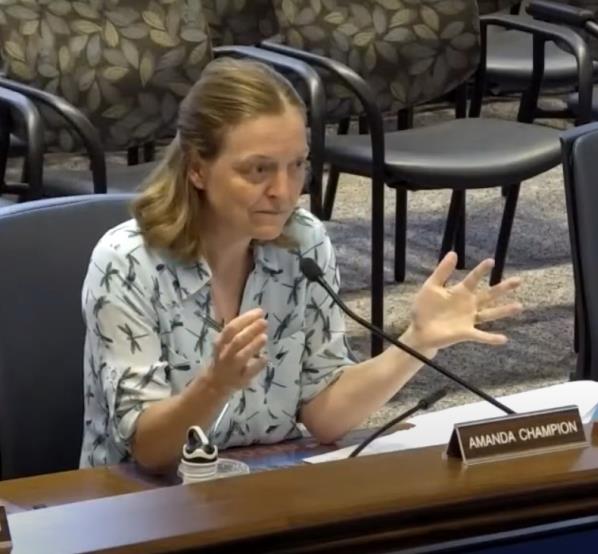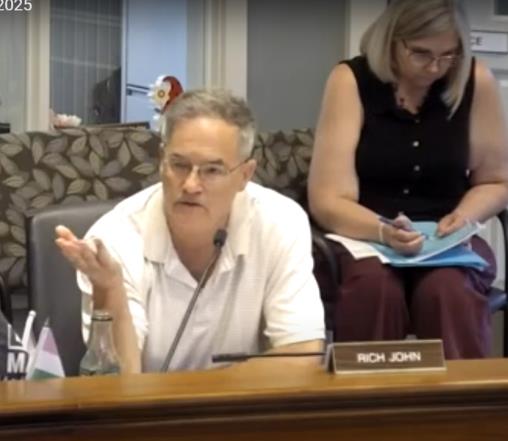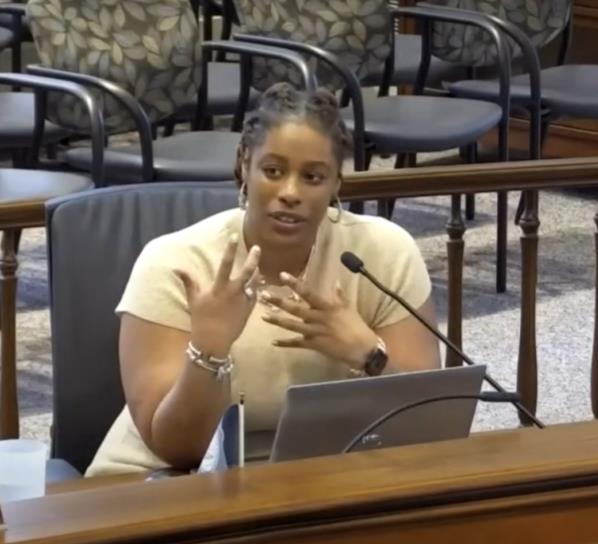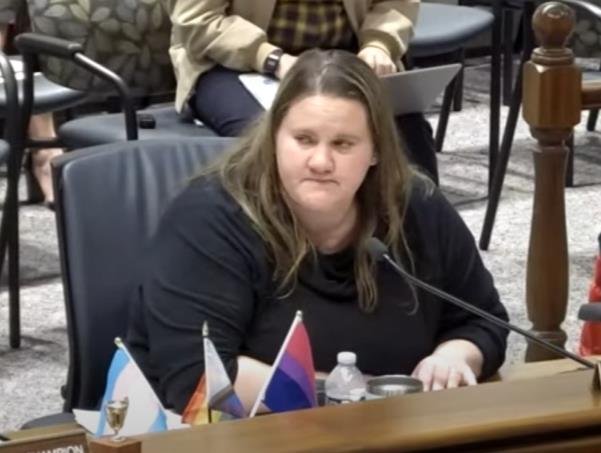Reporting and analysis by Robert Lynch; July 19, 2025
It was a fine line Tompkins County lawmakers walked this past Tuesday night. One false step and they could be sticking their political thumb into President Donald Trump’s eye. A half-dozen of their convened flock would have taken that chance; stood their ground and picked a fight,. They might have riled Trump up and prompted his retaliation. But those more daring souls didn’t prevail that night. Moderation did… sort of.

By a vote of 11-to-2, the Tompkins County Legislature July 15 endorsed a linguistically-lengthened and rhetorically-strengthened “Diversity, Equity, and Inclusion” (DEI) policy for the bureaucracy it oversees. Analyzed objectively, it’s only an aspirational document, its script heavy-laden with procedural process, mitigative assurances, and a grandiloquent, 3,300-word construction that could easily have been pared to half its length and said the same.
The adopted changes revise a “Diversity and Inclusion” policy that a prior County Legislature had passed in 2013. The policy’s recommendations and commands apply only to Tompkins County’s own administrative and personnel decisions, not to the wider Tompkins County community or workforce.
“Essentially, this is stuff that we’re already doing,” Government Operations Committee Chair Amanda Champion assured those convened with her, including the more hesitant or gun-shy at the oval table. She saw the revisions as no big deal.
Nice try. That’s because words convey power. Words intended to command power convey that power commandingly. And a string of those power-words (even though labyrinthian) linked one to another only amplify the perceived power. To those in far-flung places itching for a battle over DEI, what Champion’s committee brought to the floor Tuesday night provided a capacious cache of ammunition.

President Donald Trump has declared war on DEI. His executive orders issued the day of his Inauguration, January 20, and then, again, one day later, January 21, would “terminate” all “equity actions, initiatives or programs,” first in the federal workforce, and then, to whatever extent possible, in the private sector. The “grantees” to which the President extended his DEI orders could reach county governments, the recipients of federal aid.
“I think the Executive order is illegal,” Ulysses-Enfield legislator Anne Koreman asserted in floor debate, urging adoption of the strongest possible equity language. “It’s totally illegal and unconstitutional for the federal government to be telling us which words we can use, which words we can’t, and to change our local policy.”
“So I’m not going to follow that Executive Order,” Koreman stated. “We’re going to stay the course. This is our policy. We’re just updating it.”
“Now more than ever, we have to stand up for what’s right,” Champion had advised her committee in June when it recommended the revisions to the Legislature.
Perhaps the most significant additive legislators placed into this freshened Tompkins County document was for the first time to incorporate “Equity”—the dreaded “E-Word,” as some conservatives perceive it—into its title.
“Equity” is“Fair treatment, access and advancement for each person in an organization… It reflects processes and practices that both acknowledge that we live in a world where everyone has not been afforded the same resources and treatment while also working to remedy this fact,” the revised document defines, in part.

The new policy imports “equity” into its lofty aspirational guidance document dozens of times.
Never before had Tompkins County’s diversity policy recognized “transgender status” as a classification warranting a shield against discrimination. Now it does. The words “his” and “her” have been replaced by “their” on occasion. The policy references the word “merit” only twice; once in a paragraph held over from the 2013 policy statement, and again as it quotes the New York State Constitution’s Civil Service mandate.
And nowhere in its many pages does the policy resolve what happens when the competing goals of merit and equity collide, as they inevitably will.
The revised policy neither requires nor requests minority or female preferences in hiring or promotion. Still, a reader may find the policy’s fleeting one-sentence prohibition of preferential treatment weak and awkwardly out of place with everything else written around it.
There’s a reason for that. The “disclaimer,” as it’s called, was inserted last-minute during the June 5th committee meeting as an attempt at compromise. And last Tuesday, as the full Legislature readied to take final action on the policy, the moderating sentence almost got yanked back out.
“What we have here is a policy that a broad swath of the people who live in Tompkins County despise this language,” legislator Rich John, a law professor, told committee members back in June. “I’m not saying it’s right that they do. But if we have any hope or intent… to persuade, we’re not doing that. We are just… saying we’re doubling down on this is the language that must be used.”

Rich John suggested words from the Declaration of Independence be used instead. Legislator Koreman countered that day that in her opinion, the Declaration’s writers assigned their scripted “truths” predominantly to “white men,” and to “certain white men; a small minority.”
Charlene Holmes, Tompkins County’s Chief Equity and Diversity Officer (CEDO) gets credit for many of the policy’s compositional calisthenics. Holmes scripted the text in recent months aided by a couple of employee- and community-based committees, groups tasked with rooting out systemic race- and gender-bias within Tompkins’ governance. The CEDO’s recent Institutionalizing Equity Report inspired many of the changes. When the Legislature embraced the report back in February, Institutionalizing Equity generated a legislative workout of its own.
The rewritten DEI Policy’s introductory paragraph provides that Tompkins County’s goal is “to create, promote and sustain a workplace environment that is inclusive, equity-minded, and fosters a sense of belonging…”
A “Legislative Policy Statement,” a couple of paragraphs later, states:
“The Tompkins County Legislature is committed to the empowerment of employees and residents to dismantle systemic barriers that inhibit inclusive governance and the provision of government services to all.”
New bullet point add-ons to the policy statement would implement the Legislature’s equity vision by:

- “Establishing legislative frameworks that embed DEI principles into all county policies and decision-making processes, ensuring that diversity, equity, and inclusion are integral to governance rather than isolated initiatives,” and by
- “Overseeing the creation and implementation of strategic policies that ensure a diverse workforce… [and to] support the development of recruitment and retention practices that are aligned with the County’s broader DEI goals and strategic plan, fostering a workforce that reflects the diversity of the community.”
Addressing the Legislature, Rich John begged for a “plain language” rewrite.
“You shouldn’t be able to read it and determine which political party wrote it, and that’s the case here,” John, a Democrat, said observantly. “Our county is divided on this,” John cautioned colleagues. “There are many people who really, really dislike this style of language.”
The PC-sanitized, handbook-hackneyed academic jargon that’s infected this document is clearly Charlene Holmes’ preferred style, and perhaps also the style of the progressives who populated her assisting committees. Yes, words like Holmes’ can enthrall DEI true believers. But they can also poke a cattle prod into MAGA-base loyalists and march their nimble fingers to Truth Social and advise their chosen leader of what naughty little Ithaca has just done.

“I’m sorry, I know you all want to move forward and double-down on this, and I have no problem with that,” Democrat Deborah Dawson remarked early in Tuesday’s debate. “But having read the Executive Order, I think it would be prudent for us… to make it clear that nothing in this violates the Executive Order. I can’t vote for something that could potentially make a situation worse than it already is, sorry.”
Dawson’s comment directed itself to a failed attempt by Governmental Operations Committee Chair Amanda Champion to strip away that “disclaimer,” inserted last month in the committee she chairs. County Attorney Maury Josephson assisted in its crafting. Josephson reasoned it would inoculate the DEI policy from a Trump Administration challenge. The disclaimer stipulated that:
“Nothing contained in this policy shall be deemed, directly or indirectly, to encourage or implement terms and conditions that favor individuals based on protected characteristics unless specifically allowed by law. (E.g. Reasonable Accommodations of individuals with disabilities).”
Inserting that sentence proves a point: Without the disclaimer, the remaining directives could easily give rise, explicitly or implicitly, to outright favoritism toward persons of color, women, or gays in hiring and promotion in pursuit of affirmative action. No other policy prohibition would have blocked it.
Debate over the removal amendment divided Democrats ideologically. Republicans remained opposed.
Center-Left Democrats chose to keep the disclaimer in. Progressives, on the other hand, stood emboldened to call the President’s bluff.
“The reality is that there’s a massive target on Tompkins County’s back, and at this point we have to stand on our laurels,” former Legislature Chair Shawna Black insisted. “The reality is the majority of our constituents live here because we do what we do. We stand up for our community. We talk the talk. We walk the walk. And they know that our citizens are going to be protected.”
Of any who spoke, Black was most committed to fight.
“Let’s call ‘em on it,” Black pronounced. “We are who we are. We’re all voted in office to represent the people of Tompkins County, and personally I know that my constituents would be pissed if it didn’t have those words in it.” (Black may have misunderstood or misspoken; she’d wanted the disclaimer stripped out, not kept in.)

“I recognize that this is a hot topic, yes, but do we have disclaimers in all of our policies?” Holmes asked. Though deferential to those who employ her, the CEDO implied she’d prefer the disclaimer be gone.
Shawna Black, Amanda Champion, Anne Koreman, Travis Brooks, Veronica Pillar, and Greg Mezey each voted to extract the disclaimer. They fell two votes short of the majority needed.
The debate over wordsmithing continued.
“I think it’s okay if not every single person likes all the words in the policy.” Veronica Pillar, perhaps the Legislature’s most progressive voice, advised critics including Rich John. “I also think that to just swap out words dismisses the professionalism of the practitioners in the space of equity and diversity institutions.”
“You can’t have fairness before you have equity,” Travis Brooks, African-American, said in defense of discursive density. “So to me when you swap out a word, you take away what you’re trying to do.”

“It’s just simple to me,” Brooks continued. “We have this policy. Our county has led with love. It has led with equity. And I don’t want to change that.”
Republican Mike Sigler took a different tack: What’s simple and has stood the test of time for a dozen years commands stature and strength by its textual tenure.
“This county did lead on this issue, and I think there’s something to be said for leaving it alone,” Sigler said of the policy from 2013. “I think by leaving it alone, you’re actually making it a stronger statement than by changing it.”
Sigler also equated its rambling replacement to the “Apple terms-of-service.”
The new DEI policy—disclaimer included—passed with only Sigler and Democrat Rich John dissenting. Newfield-Enfield’s Randy Brown supported the final resolution, but opposed its earlier-suggested amendment. Groton’s Lee Shurtleff was away for the night.
The policy document prepared under CEDO Charlene Holmes’ meticulous oversight would play much better in an Equity Studies seminar than in a county, albeit liberal-leaning, yet still politically blended. One of its numerous new dictates requires each County department to “identify and incorporate 1-2 equity indicators annually into their departmental work plans.” How exactly would compliance be established and enforced? And if not followed, what consequences would follow?
“We need to meet people where they’re at, and that means speaking in a way that they understand and can listen to us,” Rich John emphasized to fellow legislators Tuesday night. If he’d had his way, John would have first sent what got voted on that night back to committee to recraft it in a way the average man or woman can understand and accept.
“The core principles are strong, good principles,” law professor John, soon to retire from the Legislature, acknowledged. “Why we have to speak in a way that alienates a good percentage of the population that we absolutely need to be allies with us, I don’t understand.”
###

